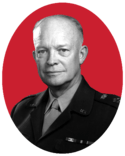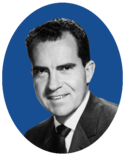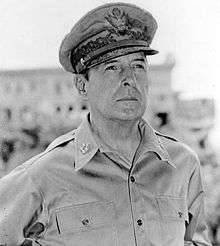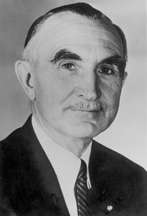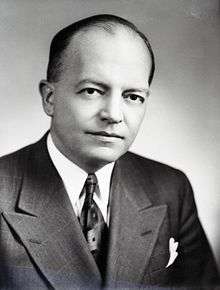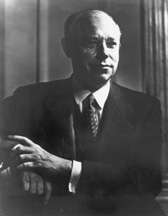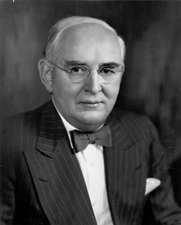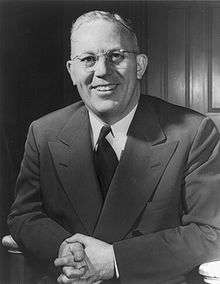1952 Republican National Convention
|
1952 presidential election | |
|
Nominees Eisenhower and Nixon | |
| Convention | |
|---|---|
| Date(s) | July 7–11, 1952 |
| City | Chicago, Illinois |
| Venue | International Amphitheatre |
| Candidates | |
| Presidential nominee | Dwight D. Eisenhower of Kansas |
| Vice Presidential nominee | Richard Nixon of California |
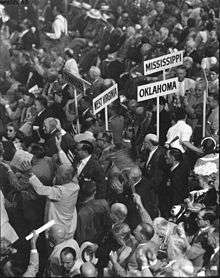
The 1952 Republican National Convention was held at the International Amphitheatre in Chicago, Cook County, Illinois from July 7 to July 11, 1952, and nominated the popular general and war hero Dwight D. Eisenhower of Kansas, nicknamed "Ike," for president and the anti-communist crusading Senator from California, Richard M. Nixon, for vice president.
The Republican platform pledged to end the unpopular war in Korea, to fire all "the loafers, incompetents and unnecessary employees" at the State Department, condemned the Roosevelt and Truman administrations' economic policies, supported retention of the Taft-Hartley Act, opposed "discrimination against race, religion or national origin", supported "Federal action toward the elimination of lynching", and pledged to bring an end to communist subversion in the United States.[1]
Candidates before the convention
- Businessman Riley A. Bender of Illinois
- Former Governor George T. Mickelson of South Dakota
- Representative Thomas H. Werdel of California
The balloting
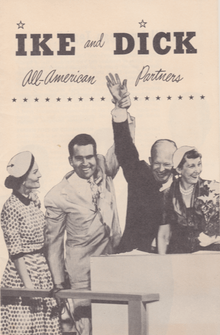
| Presidential balloting, RNC 1952 | ||
| Contender: ballot | 1st before shifts | 1st after shifts |
|---|---|---|
| General Dwight D. Eisenhower | 595 | 845 |
| Ohio Senator Robert A. Taft | 500 | 280 |
| Governor Earl Warren of California | 81 | 77 |
| former Minnesota Governor Harold Stassen | 20 | 0 |
| General Douglas MacArthur | 10 | 4 |
Vice Presidential
Eisenhower was so unfamiliar with party politics that even after his nomination he believed that the delegates would choose the vice-presidential nominee, surprising his advisors Lucius D. Clay and Herbert Brownell. When they explained that the delegates would support whomever he chose, Eisenhower suggested businessmen he knew such as Charles E. Wilson and C. R. Smith. Clay and Brownell explained that a running mate should be a politician who balanced the ticket in geography, age, and other areas, and suggested Richard Nixon, who had helped Eisenhower win California's delegates. Eisenhower had met Nixon, and accepted the suggestion. Nixon was nominated unanimously.[2]
See also
- List of Republican National Conventions
- 1952 Democratic National Convention
- U.S. presidential nominating convention
- U.S. presidential election, 1952
References
- ↑ "Republican Party Platform of 1952". Political Party Platforms: Parties Receiving Electoral Votes: 1840-2012. The American Presidency Project. Retrieved 13 October 2012.
- ↑ Smith, Jean Edward (2012). Eisenhower in War and Peace. Random House. pp. 520–522. ISBN 978-0-679-64429-3.
External links
- Republican Party platform of 1952 at The American Presidency Project
- Eisenhower acceptance speech at The American Presidency Project
| Preceded by 1948 Philadelphia, Pennsylvania |
Republican National Conventions | Succeeded by 1956 San Francisco, California |
